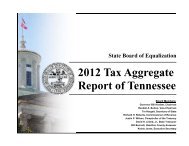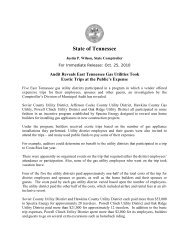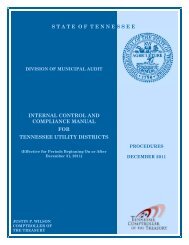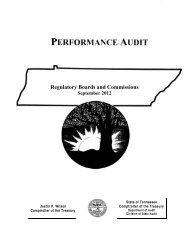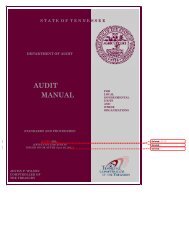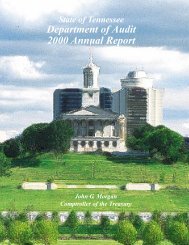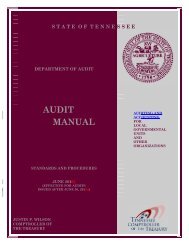Peace Officer Standards and Training Commission and Law ...
Peace Officer Standards and Training Commission and Law ...
Peace Officer Standards and Training Commission and Law ...
- No tags were found...
You also want an ePaper? Increase the reach of your titles
YUMPU automatically turns print PDFs into web optimized ePapers that Google loves.
include hiring costs <strong>and</strong> normal employee costs, including salaries, benefits, <strong>and</strong> otheradministrative costs. Also, costs associated with the community college academies at Clevel<strong>and</strong>State <strong>and</strong> Walters State include normal college tuition costs as officers attending these academiesare actually enrolled in college-credit classes.Management at the non-LETA academies believe that their academies were initiallydeveloped as a means of alleviating the large class sizes at LETA. Some emphasized that thesheer number of officers that LETA must train each year limits the basic class to 450 hours. TheTennessee Highway Patrol (THP) academy itself conducts a 1,300-hour basic class.Management at the non-LETA academies believe that while LETA does a great job, utilizingexcellent instructors, it cannot offer more h<strong>and</strong>s-on training because of the class sizes, is limitedin the areas covered because of time constraints, <strong>and</strong> is unable to specialize in areas unique tolocal jurisdictions. For example, the local police <strong>and</strong> sheriff’s departments emphasized the needfor instruction in process serving, court security, radio systems, <strong>and</strong> paperless record databases.The THP academy leaders emphasized the need for more intense training in areas such asaccident investigations, riot training <strong>and</strong> officer survival, weighing station operations, <strong>and</strong>increased firearms training (four weeks).According to LETA management, new POST rules will restrict the establishment of newoutside training academies. Potential academies will be required to show a need—specifically,that they will train a minimum of 100 of their own officers annually, or if they provide trainingto other agencies, they must have a total immersion resident program. This would require havinghousing for trainees during the training program. Prior to this rule, the only requirement forestablishing a new academy was that the academy had to meet facility, training, <strong>and</strong> facultyguidelines.THE POST COMMISSION HAS IMPLEMENTED FORMAL POLICIES FOR PROCESSINGINCOME SUPPLEMENT REQUESTS, ADDRESSING CONCERNS INITIALLY IDENTIFIED BYAUDITORSAuditors’ initial review of the <strong>Peace</strong> <strong>Officer</strong> <strong>St<strong>and</strong>ards</strong> <strong>and</strong> <strong>Training</strong> (POST)<strong>Commission</strong>’s processing of income supplements for police officers identified several concerns(detailed below). However, as described in the final paragraph of this observation <strong>and</strong> comment,the commission has now addressed those concerns.Section 38-8-104(11), Tennessee Code Annotated, authorizes the POST <strong>Commission</strong> toadminister income supplements for police officers. For the calendar year ending December 31,2005 (our period of review), the POST <strong>Commission</strong> paid $6,119,622.60 to law enforcementagencies in income supplements for 11,798 police officers. In some instances, a lawenforcement agency received more or less money than it originally requested for its officers.However, because of a lack of written policies <strong>and</strong> inadequate documentation, auditors were notable to determine why an agency received more or less money than it originally requested.11



